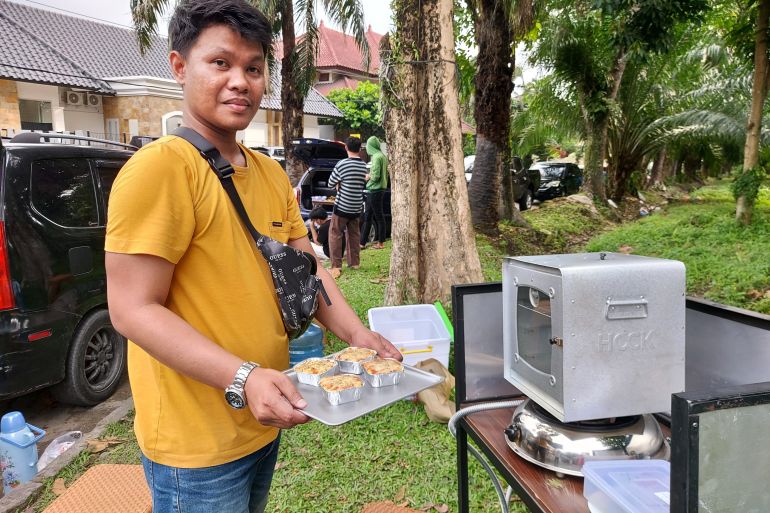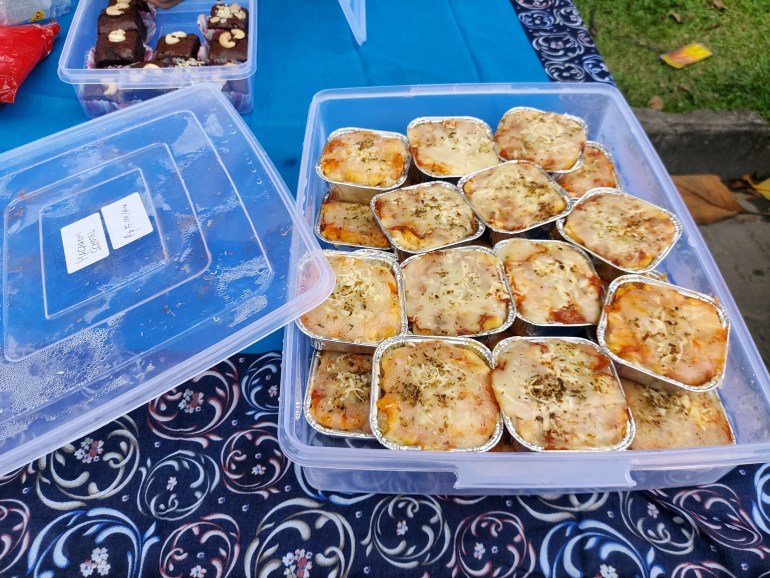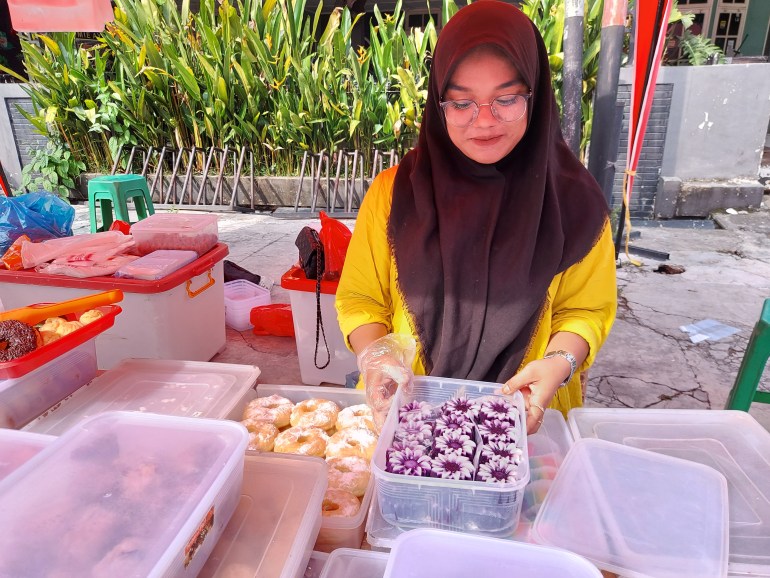Indonesia’s snack stalls pray for Ramadan bonanza after COVID
Small business owners are hoping to do a roaring trade in snacks known as takjil after several tough years due to COVID.

Medan, Indonesia – At about 3pm every day during the holy month of Ramadan, Mohammad Reza, 34, gets to work at his roadside stall in the Indonesian city of Medan.
Using a gas-powered oven set on a grassy bank next to a busy roundabout, Reza heats up precooked portions of macaroni schotel to sell to hungry Indonesians who have been fasting from sunrise to sunset.
Keep reading
list of 4 itemsPhotos: Indian Muslims celebrate the beginning of Ramadan
Photos: Tunisia’s coppersmiths put a shine on Ramadan
Ramadan recipe: Chicken zorbiyan, memories of Yemen, and my mom
“I enjoy selling takjil as it is simple,” Reza, who runs a chicken restaurant during the rest of the year, told Al Jazeera. “I only work from three to six o’clock in the evening and can make around an 80 percent profit.”

Takjil are small nibbles or light dishes eaten in Indonesia for iftar — the meal at sunset when Muslims break fast. Takjil means “to speed up” in Arabic and has in turn been adopted into Bahasa Indonesia to mean “to speed up breaking fast”.
Reza said that some of his regular customers at his restaurant also double as takjil buyers — they gave him the idea of bite-sized macaroni schotel as a takjil dish, which Reza makes from pasta, chicken mince, sausage and marinara sauce.
As the dish is on the Ramadan menu for the first time this year, Reza is not sure how well it will be received and is only making about 50 portions per day to test the waters.
While Indonesia’s restaurateurs have traditionally seen takjil as a lucrative way to make money before the Eid al-Fitr holiday that marks the end of Ramadan, business took a severe hit during the COVID-19 pandemic.
At the height of the pandemic in 2020 and 2021, Reza was forced to sell his takjil in front of his home. The bulk of his sales came online via food delivery apps Grab and GoFood.
Even with the help of business online, Reza still only made approximately half the amount that he can make with a roadside stall — about $329 during the month. Last year, he made about $658 by selling takjil by the side of the road in one of the largest residential complexes in Medan, something that he is repeating this year.

Schoolgirl Naila’s family has been selling takjil snacks since her father, now in his 40s, was in school. Now Naila, 18, and her cousin Dava, 16, are in charge of the family snack stall.
“The chocolate-covered bananas are the most popular snack we sell, probably because they are so sweet and people like sweet things when they have been fasting all day,” Naila told Al Jazeera.
The takjil stall can make about $130 daily, making it more lucrative than the family chicken restaurant, which typically pulls in about $92.
The family sells roughly 50 different kinds of snacks, including fried spring rolls, mini doughnuts, jellies, pancakes and cream puffs. There are so many different varieties that they are not sure how many portions they sell, only that the number is in “the hundreds”.

Compared with Naila and Dava, Dewi Putri, who is studying at university to be a pharmacist, is a newcomer to the takjil business.
This year, the 22-year-old is hoping to make some extra cash during Ramadan by selling es buah, a popular iced fruit cocktail dessert. She chose es buah as it requires no cooking or special equipment and has enlisted two friends to help her serve customers.
Putri makes the drink by mixing raspberry syrup with condensed milk before adding different kinds of fruit such as papaya, dragon fruit, melon and strawberries, as well as grass jelly and nata de coco.
“This is the first year that I’ve sold takjil, and I’m hoping it’s successful,” she told Al Jazeera. “I’m just trying my best to see if it works. It’s better than sitting in my dormitory all day.”